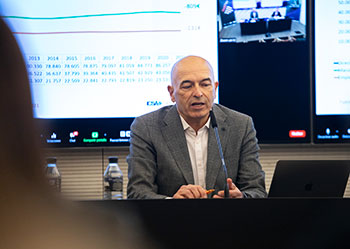15th Wage growth report 2007-2020 by EADA and ICSA Grupo
 Top-level managers, middle managers and employees wages decreased in 2021 due to the high inflation -which reached 2.9% until July and grew by 4.7% until December- and also the economic crisis derived from the pandemic. This is the main conclusion of the 15th edition of the Wage Growth 2007-2021 Report by EADA and ICSA Grupo. Those who have had a greater loss of purchasing power have been top-level managers, whose average salary has gone from 86,257 euros to 82,719 euros, which is 4.10% less. Middle managers have gone from 43,056 euros to 42,247 euros today (-1.88%) and workers, from 23,531 euros to 23,400 euros.
Top-level managers, middle managers and employees wages decreased in 2021 due to the high inflation -which reached 2.9% until July and grew by 4.7% until December- and also the economic crisis derived from the pandemic. This is the main conclusion of the 15th edition of the Wage Growth 2007-2021 Report by EADA and ICSA Grupo. Those who have had a greater loss of purchasing power have been top-level managers, whose average salary has gone from 86,257 euros to 82,719 euros, which is 4.10% less. Middle managers have gone from 43,056 euros to 42,247 euros today (-1.88%) and workers, from 23,531 euros to 23,400 euros.
The banking and insurance sectors continue to maintain a strong position. According to Dr. Jordi Assens, Professor of Strategy, Leadership and People at EADA, “this sector has to reinvent itself in line with the transformation of FinTechs because, otherwise, it will continue to impact on wages and incomes”. This is the same for the industry sector, due to its internacionalisation and exports, and the transport sector, due to the distribution boom in this period. On the opposite side is the commerce and tourism sector, which has registered the steepest drop in wages as it is the most affected by the pandemic. An analysis of wages in professional categories reveals that the highest earners are top-level managers in the banking and insurance sectors (90,271 euros), followed by those in transport sector (88,048 euros) and finally those who work in the industry (82,075 euros). The highest-paid middle managers can also be found in banking and insurance (49,556 euros), followed by those in the construction industry (43,318 euros) and those in industry (42,715 euros). For workers, the highest earners are those who work in the industrial sector (27,470 euros), followed by those in banking and insurance (26,955 euros) and construction (23,412 euros).
SMEs and microbusinesses have been once again the most affected by the pandemic. Many of them have been forces to let talent go and reduce salaries. Large corporations, despite being affected by the economic situation, have better resisted the crisis by maintaining jobs and salaries.
Priorities to cause a change in trend
 During the presentation of the report, Ernesto Poveda, Chairman of ICSA Grupo, assured that “one of the priorities is to move towards a flexible remuneration model that is better suited to current circumstances and needs of professionals.” To him, it is counterproductive that fixed salary continue linked to the CPI (Consumer Price Index): “It should be a variable to take into account, but not the only one, because it is necessary to incorporate concepts such as conciliation, greater flexibility or teleworking, which are new forms of compensation that better align with the sustainability of the organization and the retention of talent.”
During the presentation of the report, Ernesto Poveda, Chairman of ICSA Grupo, assured that “one of the priorities is to move towards a flexible remuneration model that is better suited to current circumstances and needs of professionals.” To him, it is counterproductive that fixed salary continue linked to the CPI (Consumer Price Index): “It should be a variable to take into account, but not the only one, because it is necessary to incorporate concepts such as conciliation, greater flexibility or teleworking, which are new forms of compensation that better align with the sustainability of the organization and the retention of talent.”
Professor Jordi Assens added a reflection on the link between innovation & productivity and higher salaries: “In Spain, innovation only accounts for 1.4% of GDP, a percentage which is far away from the best economies in Europe. Focusing on productive and innovative companies is more than ever a priority. It is more important and more effective than a labour reform passed by the government to increase salaries.” Assens recommended promoting public-private alliances and betting more on start-ups, which in the coming years can become large companies.
Salaries in the Autonomous Communities
The best paid professionals are those from Madrid in all the categories. In the case of top-level managers, the most favored are those from Madrid (88,758 euros), followed by those in Catalonia (86,791 euros) and Navarra (82,781 euros). The middle managers with higher salaries are those from Madrid (44,821 euros), followed by those in Catalonia (43,254 euros) and Asturias (41,936 euros). The highest-paid employees are those from Madrid (24,942 euros), followed by those from Navarra (24,852 euros) and Catalonia (24,564 euros).
